Injectable Anaesthesia &
Surgery -
Dermoid In The Shih Tzu
Dr Sing Kong Yuen, BVMS (Glasgow), MRCVS
Date:
15 September, 2020
|
 toapayohvets.com toapayohvets.com
Be Kind To Pets
Veterinary Education
Project 2010-0129 |
2009 Case: Dermoid Surgery in a Shih
Tzu
Case was first recorded:
Oct 1,2009
Education of Vet
Technicians from Myanmar and one intern from Temasek
Polytechnic in this case by using injectable
anaesthestics.
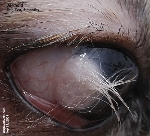 Normally, I give xylazine 20 at 0.2 ml IM,
and after 10-15 minutes give gas mask
isoflurane. Then I
intubate and it will be a smooth operation. Normally, I give xylazine 20 at 0.2 ml IM,
and after 10-15 minutes give gas mask
isoflurane. Then I
intubate and it will be a smooth operation.
However,
injectable anaesthetics have a place in vet surgery
(e.g. devocalisation). Isoflurane and the anaesthestic
machine are expensive. Maintenance of the vaporiser is not
possible due to the lack of expertise in some developing
countries and injectable anaesthesia is the alternative.
However, in Caesarean sections, injectable anaesthesia is not
advised as the puppies may be delivered dead.
I seldom use injectable anaesthetics. In this case, I did and
am sharing my experiences of using injectable anaesthesia
below for the benefit of dogs.
|
Shih Tzu, 8 months, 5 kg
1. Xylazine 20 at 0.2 ml + ketamine 100 at 0.2 ml in
one syringe = 0.4 ml IV. (The guideline is 0.25 + 0.25
= 0.5 ml for a 5 kg dog)
2. Zoletil 50 at 0.1 ml IM after 5 minutes. Proceed to
electro-incision.
3. Excellent surgical anaesthesia for <15 minutes.
Time taken to set up electro-surgery equipment delayed
surgery. Soon the dog's eyes start to blink under
electro-incision.
4. In practices with no isoflurane gas anaesthesia,
top up with 0.1 ml Zoletil IM regularly is workable.
5. I gave isoflurane gas by mask, intubate and
maintain at 2-2.5% without worries of topping up
injections. This surgery needs to be done carefully
without the dog waking up or blinking his eye as the
cornea is around 2 mm thick and any movement may
rupture the cornea via electro-incision.
6. Recovery. The dog woke up smoothly as if he
had a good sleep. No painful cries or struggle.
7. Advantages: No post-xylazine vomiting. No
post-Zoletil stiff neck or salivation in this case
though no atropine (usually 0.2 ml IM) was used.
8. Conclusion: In this case, I hope that the
mentees can see that the xylazine + ketamine + Zoletil
+isoflurane combination takes up more time and is not
as efficient as xylazine IM + isoflurane in this
surgery. But it has a place in vet surgery in
certain situations like field work, but the vet must be
familiar with this injectable anaesthesia method.
Not
all vets will agree with my philosophy - minimal use
of drugs for sedation to avoid reactions and shortest
time to achieve surgical anaesthesia. That is why I
seldom use the xylazine + Zoletil top up combination
or xylazine + ketamine + Zoletil top up combination.
It may cause respiratory depression although certain
sedatives are synergistic and lead
to lower dosages required if used
as a combination (e.g. domitor +
ketamine). It just takes up
too much time to administer top ups when the vet has
to focus on a speedy surgery.
UPDATE: 15 Sep 2020.
Superficial keratectomy using
electro-surgery. Successful
outcome.
See updated information at:
https://2010vets.blogspot.com/2020/09/3150-8-month-old-shih-tzu-has-ocular.html
|
 |
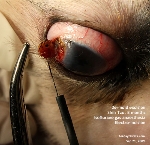 |
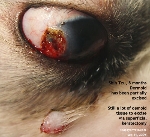 |
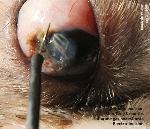 |
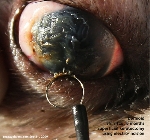 |
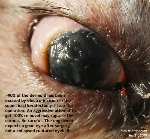 |
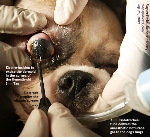 |
Dermoid in the right eye is
electro-excised |
 |
 |
 |
|
3rd eyelid flap for 4 days. |
Day 9 after excision. Cornea heals
well. Healing of
the cornea should be completed in
another 21 days. |
The normal left eye has a
clear cornea. |
In the
2009 case, a 3rd eyelid flap and tarsorrhaphy has been done. The sutures were removed on Day 4 to open the eyelids
so as to examine the cornea for infection although
antibiotic eye drops were given. The sclera was
acutely inflamed. By Day 9, the owner wanted the dog
home. 7 more days of nursing would be better for the
dog. The domestic worker was taught how to apply the
eye drops. E-collar must be worn at all times for 1
month, no exposure of the eye to sunlight and breeze
for the next 3-4 weeks. The dog would now enjoy a
better quality of life with no irritating Dermoid in
his right eye cornea.
The sutures were removed on Day 4 to open the eyelids
so as to examine the cornea for infection although
antibiotic eye drops were given. The sclera was
acutely inflamed. By Day 9, the owner wanted the dog
home. 7 more days of nursing would be better for the
dog. The domestic worker was taught how to apply the
eye drops. E-collar must be worn at all times for 1
month, no exposure of the eye to sunlight and breeze
for the next 3-4 weeks. The dog would now enjoy a
better quality of life with no irritating Dermoid in
his right eye cornea.
UPDATE: May 10, 2011. No
complaints from the owner since
the surgery. I presume all are OK
with the dog. As many Singapore
pet owners go to the nearest
veterinary practice, it is not
possible for me to follow up some
of my interesting surgical cases
like this dermoid.
|
UPDATE: 15 Sep 2020.
Superficial keratectomy using
electro-surgery. Successful
outcome.
See updated information at:
https://2010vets.blogspot.com/2020/09/3150-8-month-old-shih-tzu-has-ocular.html |
|
|
2011 Case: Dermoid Surgery in a Shih
Tzu
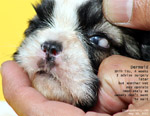 In
May 2011, a Pasir Ris breeder brought in a 6-week-old Shih Tzu
with a dermoid. He had been a dog breeder for more than 10
years. In
May 2011, a Pasir Ris breeder brought in a 6-week-old Shih Tzu
with a dermoid. He had been a dog breeder for more than 10
years.
I the advised that surgery not be done at this young age. I
asked him to postpone surgery till the
cornea becomes thicker with age or sell the puppy at a "loss"
and let the new puppy owner get the dermoid cut off when the
puppy grows older. He wanted to sell the Shih Tzu at 8 weeks
of age. The selling price of the Shih Tzu is around S$500. It
is unlikely that any puppy buyer will pay $500 for the puppy.
"Even if the cyst is removed, there is still a white patch," I
said to him.
As he consults my associate vet, Dr Vanessa Lin, I did not
advise him further. Much depends on the veterinary surgeon on
the spot as to whether surgery can be performed at 4 weeks of
age or later.
See also:
2003 Case: Dermoid in a Shih Tzu
P.S
Recording dermoid cases with images online enables the
practising vet to refer to how such rare cases are managed
when another presents itself. Memories will fade with time and
the internet now inexpensively permits knowledge sharing and
storage. I hope fellow veterinarians in cyberspace will
benefit from this case study. Be sure to have a steady hand
when you operate on dermoid! |
|
Advertisement |
|
|
|
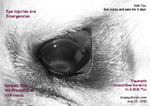 More
info at:
Dogs or
Cats More
info at:
Dogs or
Cats
To make an appointment:
e-mail
judy@toapayohvets.com
tel: +65 9668-6469, 6254-3326 |
 toapayohvets.com toapayohvets.com
Be Kind To Pets
Veterinary Education
Project 2010-0129 |
|
|
 TOA
PAYOH VETS
TOA
PAYOH VETS TOA
PAYOH VETS
TOA
PAYOH VETS